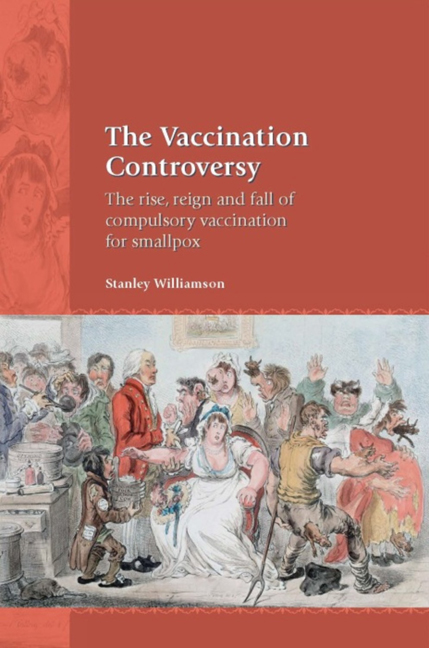Book contents
- Frontmatter
- Dedication
- Epigraph
- Contents
- Acknowledgements
- Part I The Road to Compulsion
- 1 The Byzantine Operation
- 2 The Small Pockes
- 3 The Engrafted Distemper
- 4 The Language of Figures
- 5 The Suttonian System
- 6 The Great Benefactor
- 7 The Speckled Monster
- 8 The Three Bashaws
- 9 A Competent and Energetic Officer
- 10 Formidable Men
- 11 The Present Non-System
- 12 Toties Quoties
- 13 Crotchety People
- Part II The Reign of Compulsion
- Part III The Retreat from Compulsion
- Notes
- Bibliography
- Index
12 - Toties Quoties
from Part I - The Road to Compulsion
- Frontmatter
- Dedication
- Epigraph
- Contents
- Acknowledgements
- Part I The Road to Compulsion
- 1 The Byzantine Operation
- 2 The Small Pockes
- 3 The Engrafted Distemper
- 4 The Language of Figures
- 5 The Suttonian System
- 6 The Great Benefactor
- 7 The Speckled Monster
- 8 The Three Bashaws
- 9 A Competent and Energetic Officer
- 10 Formidable Men
- 11 The Present Non-System
- 12 Toties Quoties
- 13 Crotchety People
- Part II The Reign of Compulsion
- Part III The Retreat from Compulsion
- Notes
- Bibliography
- Index
Summary
Simon's assessment of the four-year campaign of inspection was that it provided ‘an account of the working of our present vaccination laws which […] offers such a basis as there has never yet been for effective legislation against small-pox’. Stevens, speaking for those who, like himself, had been doing the arduous leg-work, took the less complacent view that it was entirely hopeless to attempt to secure to the people ‘such an amount of protection as they have the right to claim […] from the law as at present administered’. The cause lay with no one person or with any one union – it was simply ‘the system’ that was at fault. ‘Gentlemen of influence’ in every district had without exception expressed to him their opinion that ‘no improvement could possibly be effected under the existing Vaccination Acts’. There could be no disagreement, except perhaps from the anti-vaccination lobby which had shown its head above the parapet a few years earlier, but had still to get itself organized; the mass of parents, unconsulted as usual, continued to treat the whole issue with the ‘indifference and idleness’ of which Seaton had recently accused them.
In February 1866 a Bill to ‘consolidate and amend the statutes relating to vaccination in England’ was brought forward, sent to a select committee and returned in a revised form in June. In normal circumstances the Act would probably have been on the statute book by the end of the year; but the circumstances, once again, though not abnormal, were unfavourable: a change of government caused it to be lost, but only temporarily. The incoming government, although not viewing it with much enthusiasm, revived it in 1867, a development that had a profound bearing on the history of compulsory vaccination. To understand why, a few steps must be retraced.
In 1864 the partnership of Simon and Lowe was dissolved for practical purposes following Lowe's departure from the administration. His only formal contribution to vaccination in the immediately preceding years was the passing of the Act of 1861, with which the lost clause of its predecessor of 1859 was retrieved. The effect was minimal.
- Type
- Chapter
- Information
- The Vaccination ControversyThe Rise, Reign and Fall of Compulsory Vaccination for Smallpox, pp. 155 - 162Publisher: Liverpool University PressPrint publication year: 2007



